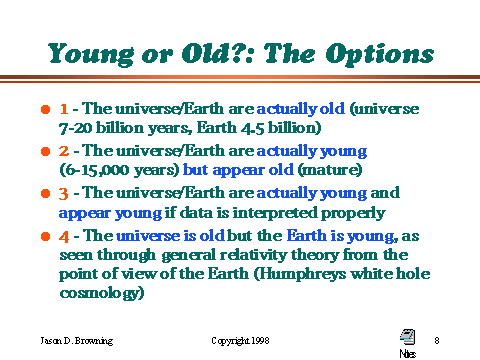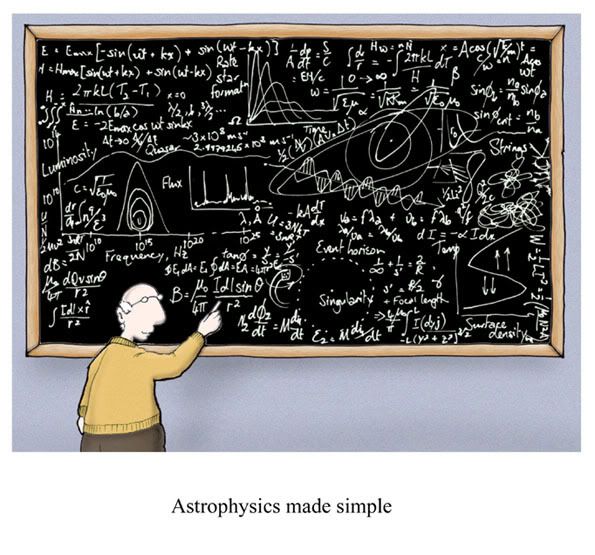http://www.answersingenesis.org/articles/nab/does-starlight-prove
The Assumption of Rigidity of Time
Many people assume that time flows at the same rate in all conditions. At first, this seems like a very reasonable assumption. But, in fact, this assumption is false. And there are a few different ways in which the nonrigid nature of time could allow distant starlight to reach earth within the biblical timescale.
Albert Einstein discovered that the rate at which time passes is affected by motion and by gravity. For example, when an object moves very fast, close to the speed of light, its time is slowed down. This is called “time-dilation.†So, if we were able to accelerate a clock to nearly the speed of light, that clock would tick very slowly. If we could somehow reach the speed of light, the clock would stop completely. This isn’t a problem with the clock; the effect would happen regardless of the clock’s particular construction because it is time itself that is slowed. Likewise, gravity slows the passage of time. A clock at sea-level would tick slower than one on a mountain, since the clock at sea-level is closer to the source of gravity.
It seems hard to believe that velocity or gravity would affect the passage of time since our everyday experience cannot detect this. After all, when we are traveling in a vehicle, time appears to flow at the same rate as when we are standing still. But that’s because we move so slowly compared to the speed of light, and the earth’s gravity is so weak that the effects of time-dilation are correspondingly tiny. However, the effects of time-dilation have been measured with atomic clocks.
Since time can flow at different rates from different points of view, events that would take a long time as measured by one person will take very little time as measured by another person. This also applies to distant starlight. Light that would take billions of years to reach earth (as measured by clocks in deep space) could reach earth in only thousands of years as measured by clocks on earth. This would happen naturally if the earth is in a gravitational well, which we will discuss below.
Many secular astronomers assume that the universe is infinitely big and has an infinite number of galaxies. This has never been proven, nor is there evidence that would lead us naturally to that conclusion. So, it is a leap of “blind†faith on their part. However, if we make a different assumption instead, it leads to a very different conclusion. Suppose that our solar system is located near the center of a finite distribution of galaxies. Although this cannot be proven for certain at present, it is fully consistent with the evidence; so it is a reasonable possibility.
In that case, the earth would be in a gravitational well. This term means that it would require energy to pull something away from our position into deeper space. In this gravitational well, we would not “feel†any extra gravity, nonetheless time would flow more slowly on earth (or anywhere in our solar system) than in other places of the universe. This effect is thought to be very small today; however, it may have been much stronger in the past. (If the universe is expanding as most astronomers believe, then physics demands that such effects would have been stronger when the universe was smaller). This being the case, clocks on earth would have ticked much more slowly than clocks in deep space. Thus, light from the most distant galaxies would arrive on earth in only a few thousand years as measured by clocks on earth. This idea is certainly intriguing. And although there are still a number of mathematical details that need to be worked out, the premise certainly is reasonable. Some creation scientists are actively researching this idea.








 : It makes it LOOK like you don't have any other answer but "god did it that way and who are we to question it". That isn't a pathway to truth. . . if you are interested IN the truth.
: It makes it LOOK like you don't have any other answer but "god did it that way and who are we to question it". That isn't a pathway to truth. . . if you are interested IN the truth.
 Deception of future scientists? Teach me about black hole event horizons, tell me why we have theories of dark energy and dark matter and while doing so, don't resort to speculation about matters beyond our ability to understand -- then, after you've explained things we can observe, declare God's intentions again.
Deception of future scientists? Teach me about black hole event horizons, tell me why we have theories of dark energy and dark matter and while doing so, don't resort to speculation about matters beyond our ability to understand -- then, after you've explained things we can observe, declare God's intentions again.